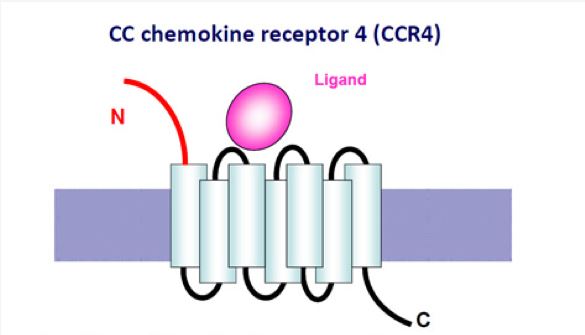Introduction of CCR-4
CCR-4 (designated CD194), which belongs to the G-protein-coupled receptor family, is encoded by the CCR4 gene. It is a receptor for the CC chemokine including CCL2 (MCP-1), CCL4 (MIP-1), CCL5 (RANTES), CCL17 (TARC), and CCL22 (Macrophage-derived chemokine). CCR4 is often expressed on leukemic cells in cutaneous T-cell lymphoma (CTCL). And it was indicated to be predominantly expressed by medullary CD4-single positive thymocytes expressing CD30, supporting its possible role in negative selection.
| Basic Information of CCR-4 | |
| Protein Name | C-C chemokine receptor type 4 |
| Gene Name | CCR4 |
| Aliases | K5-5, CD194, CC-CKR-4 |
| Organism | Homo sapiens (Human) |
| UniProt ID | P51679 |
| Transmembrane Times | 7 |
| Length (aa) | 360 |
| Sequence |
MNPTDIADTTLDESIYSNYYLYESIPKPCTKEGIKAFGELFLPPLYSLVFVFGLLGNSVVVLVLFKYKRL RSMTDVYLLNLAISDLLFVFSLPFWGYYAADQWVFGLGLCKMISWMYLVGFYSGIFFVMLMSIDRYLAIV HAVFSLRARTLTYGVITSLATWSVAVFASLPGFLFSTCYTERNHTYCKTKYSLNSTTWKVLSSLEINILG LVIPLGIMLFCYSMIIRTLQHCKNEKKNKAVKMIFAVVVLFLGFWTPYNIVLFLETLVELEVLQDCTFER YLDYAIQATETLAFVHCCLNPIIYFFLGEKFRKYILQLFKTCRGLFVLCQYCGLLQIYSADTPSSSYTQS TMDHDLHDAL |
Function of CCR-4 Membrane Protein
Chemokines, act as the ligands of CCR-4, are a series of small polypeptide (approximately 8 to 14 kD), structurally related molecules that modulate cell trafficking of various types of leukocytes. The chemokines also play essential roles in the development, homeostasis, and function of the immune system, and they have effects on cells of the central nervous system (CNS) as well as on endothelial cells implicated in angiogenesis or angiostasis. The activity of CCR-4 is mediated by G(i) proteins which activate a phosphatidylinositol-calcium second messenger system. The importance of CCR4 and its ligand in allergic diseases has been fully proved by both human clinical samples and mouse disease models. The pivotal role of CCR-4 in skin-homing T cells has also been reported. This receptor can act as a chemoattractant homing receptor on circulating memory lymphocytes, as well as a coreceptor for some primary HIV-2 isolates. What’s more, it could mediate hippocampal-neuron survival in the CNS.

Application of CCR-4 Membrane Protein in Literature
1. DeFea K. Arresting CCR4: A New Look at an Old Approach to Combating Asthma. Am J Respir Cell Mol Biol. 2018, 58(6): 673-675. PubMed ID: 29856260
This article suggests that CCR4 is an enticing target for the treatment of asthma since it is important for recruitment of Th2 cells to the airway and its levels are increased on T cells of patients with asthma.
2. Dai J., et al. Potential Association of Anti-CCR4 Antibody Mogamulizumab and Graft-vs-Host Disease in Patients With Mycosis Fungoides and Sézary Syndrome. JAMA Dermatol. 2018, 154(6): 728-730. PubMed ID: 29800117
The author of this article evaluates the use of an anti-CCR4 antibody in patients prior to allogeneic hematopoietic stem cell transplantation (allo-HSCT).
3. Fuji S. Role of anti-CCR4 antibody in the treatment of transplant-eligible patients with aggressive adult T-cell leukemia/lymphoma. Rinsho Ketsueki. 2018, 59(4): 426-431. PubMed ID: 29743403
The paper reveals that pre-transplant Moga (Mogamulizumab) was significantly associated with an increased risk of GVHD-related mortality, which supports the relevance of CCR4-expressing Tregs after allo-HSCT in humans.
4. Berlato C., et al. A CCR4 antagonist reverses the tumor-promoting microenvironment of renal cancer. J Clin Invest. 2017, 127(3): 801-813. PubMed ID: 28134623
This article demonstrated that the anti-CCR4 antibody, alone or in combination with other immune modulators, is a potential treatment approach to human solid cancers with high levels of CCR4-expressing tumor-infiltrating leukocytes and abnormal plasma CCR4 ligand levels.
5. Ou B., et al. CCR4 promotes metastasis via ERK/NF-κB/MMP13 pathway and acts downstream of TNF-α in colorectal cancer. Oncotarget. 2016, 7(30): 47637-47649. PubMed ID: 27356745
The investigations of this article showed that CCR4 might be implicated in TNF-α-regulated cancer cells metastasis and the combination of CCR4 and TNF-α is a more powerful prognostic marker for CRC patients, which indicated that CCR4 inhibition may be a promising therapeutic option for suppressing CRC metastasis.
CCR-4 Preparation Options
Our efficient Magic™ membrane protein production platform is flexible to offer different options, which can meet the specific requirements of your research. To obtain the soluble and functional target protein of your interest, our experienced scientists are proud to offer customized services with fast turnaround times. Aided by our versatile Magic™ anti-membrane protein antibody discovery platform, we also provide customized anti-CCR-4 antibody development services.
Creative Biolabs offers expert support for membrane protein studies with best-in-class membrane protein preparation strategies and procedures. Performance and delivery are further enhanced by our design and implementation of state-of-the-art technologies. Please feel free to contact us for expert advice.
All listed services and products are For Research Use Only. Do Not use in any diagnostic or therapeutic applications.